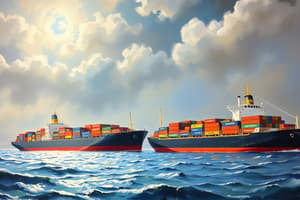Podcast
Questions and Answers
True or false: Maritime transport accounts for roughly 80% of international trade.
True or false: Maritime transport accounts for roughly 80% of international trade.
True (A)
True or false: The engine department consists of the members of a ship's crew that operate and maintain the propulsion and other systems on board the vessel.
True or false: The engine department consists of the members of a ship's crew that operate and maintain the propulsion and other systems on board the vessel.
True (A)
True or false: Seafarers often face dangerous conditions at sea or on lakes.
True or false: Seafarers often face dangerous conditions at sea or on lakes.
True (A)
True or false: Officers on modern ships typically come from all over the world and often have university degrees.
True or false: Officers on modern ships typically come from all over the world and often have university degrees.
True or false: Infrastructure for ports is necessary to efficiently send and receive cargo.
True or false: Infrastructure for ports is necessary to efficiently send and receive cargo.
Flashcards
Maritime Transport
Maritime Transport
Transport of people or goods via waterways; crucial for international trade.
Engine Department (Ship)
Engine Department (Ship)
Aboard a ship, this department operates/maintains propulsion, sewage, lighting, and water systems.
Steward's Department (Ship)
Steward's Department (Ship)
Aboard a ship, this department prepares meals, cleans, and manages stores.
Seafarers
Seafarers
Signup and view all the flashcards
Port Infrastructure
Port Infrastructure
Signup and view all the flashcards
Study Notes
-
Maritime transport is the transport of people or goods via waterways.
-
Maritime transport is a significant part of international trade.
-
The advent of aviation has diminished the importance of sea travel for passengers, though it is still popular for short trips and pleasure cruises.
-
Maritime transport is cheaper than transport by air.
-
Maritime transport accounts for roughly 80% of international trade.
-
Containerization revolutionized maritime transport starting in the 1970s.
-
Ships and watercraft are used for maritime transport.
-
Types can be distinguished by propulsion, size or cargo type.
-
Recreational or educational craft still use wind power, while some smaller craft use internal combustion engines to drive one or more propellers.
-
A ship's complement can be divided into four categories: officer positions, deck department, engine department, and steward's department.
-
The officer positions include, but are not limited to, the Master and his Chief, Second, and Third officers. The official classifications for unlicensed members of the deck department are Able Seaman and Ordinary Seaman.
-
A common deck crew for a ship includes: a deck cadet and the members of a ship's engine department.
-
The engine department consists of the members of a ship's crew that operate and maintain the propulsion and other systems on board the vessel. Engine staff also deal with the "Hotel" facilities on board, notably the sewage, lighting, air conditioning and water systems. They deal with bulk fuel transfers, and require training in firefighting and first aid, as well as in dealing with the ship's boats and other nautical tasks- especially with cargo loading/discharging gear and safety systems.
-
A common engine crew for a ship includes: a motorman and other possible positions, such as machinist, electrician, refrigeration engineer, and tankerman.
-
The steward's department is composed of a Chief Steward, a Chief Cook, and a Steward's Assistant. All three positions are typically filled by unlicensed personnel.
-
The chief steward directs, instructs, and assigns personnel performing such functions as preparing and serving meals; cleaning and maintaining officers' quarters and steward department areas; and receiving, issuing, and inventorying stores.
-
Seafarers spend much of their lives at sea, beyond the reach of land.
-
Seafarers often face dangerous conditions at sea or on lakes.
-
Members of the steward department typically are day workers who put in at least eight-hour shifts.
-
Operations at sea, including repairs, safeguarding against piracy, securing cargo, underway replenishment, and other duties provide opportunities for overtime work.
-
Service aboard ships typically extends for months at a time, followed by protracted shore leave.
-
The quick turnaround of many modern ships, spending only a few hours in port, limits a seafarer's free-time ashore.
-
Moreover, some foreign seamen entering U.S. ports from a watch list of 25 countries face restrictions on shore leave.
-
However, shore leave restrictions while in U.S. ports impact American seamen as well.
-
Shipping has changed a great deal since the 20th century, with modern ships featuring gyms and swimming pools.
-
Officers on modern ships typically come from all over the world and often have university degrees.
-
Contracts for officers average at 4 months, with generous leave.
-
Shipping has a large environmental impact, with carbon dioxide emissions equal to 2.2% of human-made emissions.
-
Infrastructure for ports is necessary to efficiently send and receive cargo.
Studying That Suits You
Use AI to generate personalized quizzes and flashcards to suit your learning preferences.



